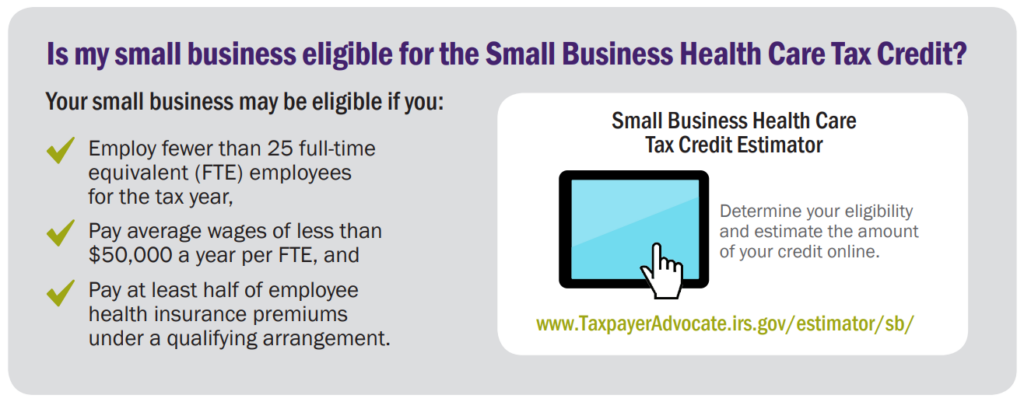
Under the Affordable Care Act, small businesses and tax-exempt organizations that meet certain qualifications are eligible for a Small Business Health Care Tax Credit (SBHCTC).

The credit helps you provide health insurance to your employees for the first time or maintain coverage you already offer. The Small Business Health Care Tax Credit Estimator helps determine whether you’re eligible for the credit for tax years 2014 and beyond and if so, estimate the amount.
The Taxpayer Advocate Service developed the Small Business Health Care Tax Credit Estimator to help you find out whether you’re eligible for the Small Business Health Care Credit and how much you might receive.

Download the full Small Business Health Care Tax Credit fact sheet.
Is your business or organization eligible for the credit?
Generally, you qualify for the credit if:
Starting in 2014, you also must pay premiums on behalf of employees enrolled in a qualified health plan offered through a Small Business Health Options Program (SHOP) Marketplace, or qualify for an exception to this requirement. However, the exceptions are extremely limited.
Some notes about full-time equivalent (FTE) employees
To determine if you have fewer than 25 FTE employees, you must consider how many hours each employee works.
The instructions for Form 8941, Credit for Small Employer Health Insurance Premiums include a worksheet to calculate your total FTE employees.
As of tax year 2014, to qualify for this credit, you must purchase insurance for your employees through the Small Business Health Options (SHOP) Marketplace.
To claim the credit, tax-exempt organizations must file an Form 990-T, Exempt Organization Business Income Tax Return, even if they don’t normally file one.
For some tax-exempt organizations, the SBHCTC is a refundable credit. This means if it’s more than the tax you owe, you may get a refund. Small businesses may be able to carry the credit back or forward to other tax years.
The amount of the credit changes over time. For tax years 2014 and later:
Beginning in 2014, the credit is only available to you for two consecutive years.
The Taxpayer Advocate Service is an independent organization within the IRS that helps taxpayers and protects taxpayers’ rights. We can offer you help if your tax problem is causing a financial difficulty, you’ve tried and been unable to resolve your issue with the IRS, or you believe an IRS system, process, or procedure just isn’t working as it should. If you qualify for our assistance, which is always free, we will do everything possible to help you.
Low Income Taxpayer Clinics (LITCs) are independent from the IRS and TAS. LITCs represent individuals whose income is below a certain level and who need to resolve tax problems with the IRS. LITCs can represent taxpayers in audits, appeals, and tax collection disputes before the IRS and in court. In addition, LITCs can provide information about taxpayer rights and responsibilities in different languages for individuals who speak English as a second language. Services are offered for free or a small fee. For more information or to find an LITC near you, see the LITC page on the TAS website or Publication 4134, Low Income Taxpayer Clinic List.